In an ambitious announcement, Indian Space Research Organisation (ISRO) Chairman S Somanath revealed that India is set to have its own space station, the ‘Bharatiya Space Station,’ within the next 25 years. Speaking at the Bharatiya Vigyan Sammelan organized by Vijnana Bharati, Somanath outlined the timeline for the project, targeting the launch of the first module by 2028.
“By 2028, we will launch the first module, that is the target. In another seven years, that is by 2035, we will build further modules and make the space station fully operational,” stated Somanath during the event. He explained that a new, more powerful rocket is being developed to carry heavier loads, crucial for the 2035 operational phase.
For the initial 2028 launch, the ISRO chief clarified that the LVM-3 rocket, capable of carrying 10 tonnes, would be used to launch an eight-tonne mass module. However, for subsequent missions and the space station’s full functionality, a more powerful rocket capable of carrying 20 of 1,215 tonnes is under development.
Somanath emphasized that the 2028 launch would involve a robotic module for experiments and docking. Human space travel to the space station is envisioned after 2035, according to the current plan.
In parallel developments, ISRO announced a significant update on India’s first solar mission, Aditya-L1. The spacecraft is expected to reach its destination, the L1 point, on January 6. Somanath stated that the exact time would be announced at an appropriate time.
“By 2023, we should be able to send an ISS into space with human beings,” Somanath added, expressing the organization’s advancements in space exploration efforts.
The development signifies a major stride in India’s space endeavors, positioning the country for a prominent role in the international space community. The ISRO’s multifaceted approach includes solar exploration and the establishment of its own space station, contributing to the nation’s technological prowess on the global stage.
















